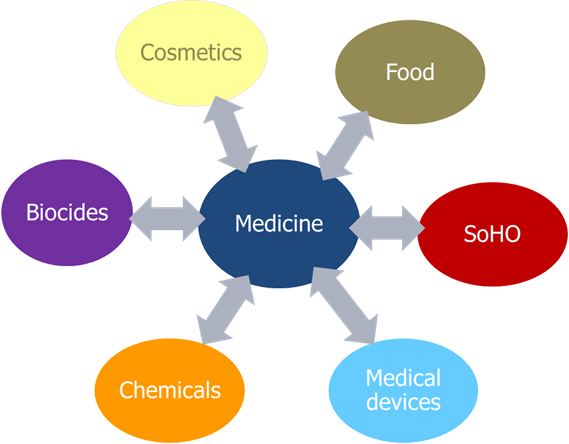EDQM activities on borderline products
As their name suggests, borderline products are products that can be difficult to assign to a specific product category. These products are either already on the market or have been manufactured for sale and supply, but the legislative framework under which they are regulated is not clear. This makes it challenging to establish which national competent authority should take the lead at the regulatory level and be responsible for ensuring their safety and for enforcement actions, i.e. removal from the market if they are found to be non-compliant and/or deemed unsafe. Assigning them to the correct area of responsibility is extremely important because requirements, supervision and enforcement measures differ significantly from one product category to another.
A common example is food supplements: generally speaking, they fall into the “food” category, but many supplements are intended to address health issues and, as such, may come within the scope of the regulations governing medicinal products.

At the end of 2018, the Committee of Experts on Quality and Safety Standards in Pharmaceutical Practices and Pharmaceutical Care (CD-P-PH/PC) and the Committee of Experts on Minimising Public Health Risks Posed by Falsification of Medical Products and Similar Crimes (CD-P-PH/CMED) called for the launch of a joint PC/CMED working group to address issues related to borderline products. The first workshop on this topic, organised in October 2019, brought together 43 experts in the field from 25 Member States and saw the creation of the EDQM Network on Borderline Products. In parallel, the working group started to work on a guidance document on the enforcement of the medical product legislation to the borderline products.
The network has officially been established in December 2021 under the governance of the European Committee on Pharmaceuticals and Pharmaceutical Care (CD-P-PH).
Purpose
- Broad international network - getting comprehensive and timely relevant information through a contact network.
- Informal exchanges on best practices, sharing intelligence, new developments and good experiences, and other help finding alternative solutions to issues encountered on a national level; these exchanges may even present the first steps towards harmonisation of procedures.
- Information exchange on new products and their impact.
- Bridge the gap between different competences.
- The group’s membership is drawn from Council of Europe member states, which include countries outside the European Union.
Scope
- The network is active in the borderline between medicinal products and other categories of products. Issues not relating to the borderline between a given product and the medicinal product category are out of scope.
- The network focuses on borderline issues related to enforcement or supervision of the legislation for medicinal products.
- Opinions or recommendations expressed within the network are not legally binding to any member.
Work programme
- Focus is on information-exchange and best practices.
- Provide a forum for discussions regarding specific borderline products, procedures or issues.
- Support co-operation between countries, but also support the CD-P-PH and its subcommittees in specific tasks related to borderline products.
- Maintain an archive of information requests and resulting exchanges of information.
Members
Network members come mainly from the health regulatory authorities of Council of Europe member states and have a background in medicines or medical devices. Various members are also part of other existing groups, such as the EU Innovation Network (EU-IN) Borderline Classification Group created by the European Medicines Agency (EMA) and the Heads of Medicines Agencies (HMA), the EMA Committee on Herbal Medicinal Products (HMPC) and the Nordic Borderline Group and, on the veterinary side, the Coordination Group for Mutual Recognition and Decentralised Procedures for Veterinary Medicinal Products - Borderline Working Group (CMDv BWG). This helps avoid duplication of effort and makes it possible to monitor new developments in the other groups.
The network meets at least once per year in f2f only mode, and once per year online. Physical meetings are hosted by member states’ authorities.
Next meeting
Planned for March 2025, to be hosted by Poland.
Past meetings
2024, Sofia, Bulgaria – topics discussed:
- Information exchange between all participants
- 3D printing of medicines
- “Legal concept of medicinal product”
- Breakout sessions on enforcement of borderline products (in support of Joint WG)
- Network-related matters
2023, Bern, Switzerland – topics discussed:
- Targeted information exchange on:
- Enforcement of hospital products
- Cross-border sale of borderline products on platforms
- Research chemicals
- Herbal products
- Co-operation with the Official Medicines Control Laboratories (OMCLs)
- Breakout sessions on “What to expect in the future/innovative medicinal products”
2022, EDQM – topics discussed:
- Interaction with customs
- Short case presentations (weight loss products, “cosmedicals”, other)
- Breakout sessions on risk assessment of borderline productsli>
- Special session on cannabis products with an intervention by the European Food Safety Authority (EFSA) and discussion on major challenges for authorities
Joint working group of the CD-P-PH/PC and CMED on the enforcement of borderline products
“Borderline Products in the Enforcement of Medical Products Legislations”
The aim of this guidance is to describe how member states could handle borderline products in different parts of their work with supervision and enforcement of the medicines legislation. Issues with borderline products can be tackled, tools and experience are available, but how this can be achieved has yet to be established by the competent national authority. The idea is to show which countries use which tools and in what way, to highlight practices that seem particularly efficient for the removal of unauthorised products and to share examples
- The result should support the national competent authorities. The idea is not to set procedures for the network/authorities to apply, but to show the procedures currently applied and potentially highlight what works well and what does not, as a sort of compendium of best practice.
See also:



